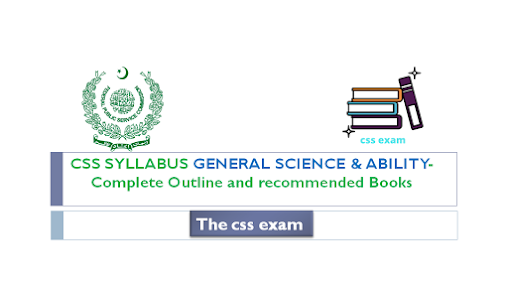CSS SYLLABUS GENERAL SCIENCE & ABILITY-Complete Outline and recommended Books
 |
| CSS SYLLABUS GENERAL SCIENCE & ABILITY |
The css ENGLISH GENERAL SCIENCE & ABILITY paper is comprised of a total of 100 marks. It is a compulsory paper related to Candidate critical analysis Skills including knowledge about scientific subjects, Logical reasoning, and IQ level. To pass the css GENERAL SCIENCE & ABILITY paper a candidate is required to secure a minimum of 40 percent marks. Or if a candidate secures a total of 120 marks in all three compulsory papers of general knowledge then also will be considered as qualified.
|
CSS SYLLABUS
GENERAL SCIENCE & ABILITY |
Part-I (General
Science) 60 Marks |
|
I. Physical
Sciences |
· Constituents and Structure:-Universe,
Galaxy, Light Year, Solar System, Sun, Earth, Astronomical System of Units. · Natural Hazards and Disasters: – Earth Quake, Volcanic
Eruption, Tsunami, Floods, Avalanche, Travelling Cyclone (Tropical Cyclone,
Middle Latitude Cyclone and Tornadoes), Drought, Wildfire, Urban Fire.
Disaster Risk Management. · Energy Resources: – Sources of Energy (Renewable i.e. LED
Energy, Solar Energy, Wind Energy, and Non-Renewable Energy conservation and
its sustainable use.
· Atomic Structure, Chemical Bonding, Electromagnetic Radiations.· Modern Materials/Chemicals: – Ceramics, Plastics, Semiconductors. Antibiotics, Vaccines, Fertilizers, Pesticides. |
|
II. Biological Sciences |
· The Basis of Life: – Cell
Structures and Functions (Subcellular Organelles such as Nucleus,
Mitochondria and Ribosomes). |
|
III. Environmental Science |
· Environment: – The Atmosphere
(Layered Structure and Composition), Hydrosphere (Water Cycle, Major Water
Compartments), Biosphere (Major Biomes) and Lithosphere (Minerals and Rocks,
Rock Types, Plate Tectonics). · Atmospheric Pollution: – Types, Sources, Causes and effects of
major air pollutants (COx, Particulate Matter, NOx, SOx, Tropospheric Ozone,
Volatile Organic Compounds, Dioxins). Regional and Global air pollution issues (Acid-rain, Ozone Depletion, Greenhouse Effect, and Global Warming).
International agreements on air pollution control (Montreal Protocol and
Kyoto Protocol).
· Water Pollution:- Types, sources, causes and effects of major
water pollutants (Synthetic Organic Chemicals, Oxygen Demanding Wastes, Plant
Nutrients, Thermal Pollution, Infectious Agents, Sediments, Radioactivity,
Heavy Metals and Acids). Drinking water quality and standards.· Land Pollution: – Solid waste management and disposal. Role of Remote Sensing and GIS in Environmental Science. · Population Planning. |
|
IV. Food Science · |
· Concept of Balance Diet: –
Vitamins, Carbohydrates, Protein, Fats and oil, Minerals, Fiber. · Food Deterioration and its Control:
– Causes of Food Deterioration, Adulteration, Food Preservation. Quality of Food:- Bioavailability of Nutrients, Appearance,
Texture, Flavor, Quality of Packed and Frozen Food, Food Additives,
Preservatives and Antioxidants |
|
V. Information Technology |
· Computer (Hardware & Software
Fundamentals); I/O Processing and data storage, Networking & Internet
Standards, Application and business Software, Social Media Websites.
Information Systems. Fundamentals of artificial intelligence. · Telecommunications: – Basics of Wireless Communication (Mobile,
Satellite, Surveillance and GPS and Fiber Optic, etc. |
|
Part-II (General Ability) 40 Marks |
VI. Quantitative Ability/Reasoning · Basic Mathematical Skills.· Concepts and ability to reasons quantitatively and solve problems in a quantitative setting. · Basic Arithmetic, Algebra and Geometry
(Average, Ratios, Rates, Percentage, Angles, Triangles, Sets, Remainders,
Equations, Symbols, Rounding of Numbers Random Sampling |
|
VII. Logical Reasoning and Analytical
Reasoning/Ability |
· Logical Reasoning includes
the process of using a rational, systematic series of steps based on sound
mathematical procedures and given statements to arrive at a conclusion · Analytical Reasoning/Ability includes
visualizing, articulating, and solving both complex and uncomplicated problems
and concepts and making decisions that are sensible based on available
information, including demonstration of the ability to apply logical thinking
to gathering and analyzing information. |
|
VIII. Mental Abilities |
· Mental Abilities Scales that measure
specific constructs such as verbal, mechanical, numerical, and social ability. |
Recommended Books for css General Science & Ability paper
|
Title |
Authors |
|
Asimov’s New Guide
to Science 1993 |
Isaac Asimov |
|
Science Restated:
Physics and Chemistry for the Non-Scientist 1970 |
Harold Gomes Cassidy |
|
Eminent Muslim
Scientists 1991 |
S. Fakhre Alam Naqvi |
|
Exploring Life
Science 1975 |
Walter A. Thurber,
Robert |
|
Exploring Physical
Science 1977 |
Walter A. Thurber,
Robert |
|
Principles of Animal
Biology 2011 |
Lancelot Hogben |
|
The Impact of
Science on Society 2005 |
Isaac Asimov, A. S.
a. N. A. S. a. |
|
Fundamentals of
Forensic Science 2010 |
Max M. Houck, Jay A.
Siegal |
|
Forensic Science
Fundamentals & Investigation 2008 |
Anthony J. Bertino |
|
Physical Geography
2013 |
Harm J. de Blij,
Peter O. Muller, James E. Burt, Joseph A. Mason |
|
Physical
Geography-Science and Systems of the Human Environment 2009 |
Alan H. Strahler,
Arthur N. Strallar. |
|
Introduction to
Information Technology 2005 |
I. T. L. Education
Solutions |
|
Management
Information Systems 2014 |
Ken Sousa, Effy Oz |
|
Fundamentals of
Telecommunications 2005 |
Roger L. Freeman |
|
Basics of
Environmental Science 2002 |
Michael Allaby |
|
Food Science 1998 |
Norman N. Potter, Joseph |
|
Environmental
Science: Systems and |
Michael L. McKinney,
Robert Schoch and Logan Yonavjak |
|
Environmental
Science: A Global Concern |
William P.
Cunningham, Barbara Woodworth Saigo |
|
Logical Reasoning |
Rob P. Nederpelt,
Farouz |
|
Elements of Logical
Reasoning |
Jan Von Plato |
|
Reasoning Builder
for Admission and |
Staff of Research |
|
Test of Reasoning |
Thorpe |
|
Mental Ability |
Dr. Lal & Jain |
|
The Brain Book: Know
Your Own Mind and |
Edgar Thorpe |





0 Comments